Reviewed by Jeffrey Sanzel
Beverly Hills Cop (1984) introduced Eddie Murphy’s Axel Foley, the street-smart Detroit detective who comes to Beverly Hills to solve the murder of his best friend. The blockbuster won the People’s Choice Award for Favorite Motion Picture, along with nominations for a Golden Globe for Best Motion Picture and an Academy Award for Best Original Screenplay. More importantly, Murphy garnered a nomination for the Best Actor Golden Globe. His two previous films—48 Hours (1982) and Trading Places (1983)—made the stand-up comic a household name. Beverly Hills Cop made him a superstar.
Two sequels followed: Beverly Hills Cop II (1987) and Beverly Hills Cop III (1994). After several aborted attempts at a new installment (including a television series), Netflix presents Beverly Hills Cop: Axel F. Murphy is joined by Judge Reinhold, John Ashton, Paul Reiser, and Bronson Pinchot, reprising their roles from previous films in the series, joined by Joseph Gordon-Levitt, Taylour Paige, and Kevin Bacon. Mark Molloy makes his feature film debut, directing the serviceable screenplay by Will Beall, Tom Gormican, and Kevin Etten.
The film opens in Detroit, where Axel (Murphy) stops a changing room theft during a Red Wings hockey game. This leads to the first of many of the film’s car chases—here with Axel driving a city snowplow. After the usual dressing down at the station, Axel receives a call from cop-turned-private investigator Billy Rosewood (Reinhold), who is pursuing a case involving a young man (Damien Diaz) framed for a cop’s murder. The boy, a drug mule, is the nephew of a cocaine trafficker (a flamboyant Luis Guzmán). Foley’s estranged daughter, Jane (Taylour Page), represents the young man, but powers-that-be threaten Jane, leading Billy to reach out to Foley, who gets on the next plane.
His first drive through Beverly Hills effectively contrasts with the Detroit opening, emphasizing Axel’s fish-out-of-water vibe. Like the entire movie, it does not aim for subtlety but makes its point about California’s mecca of facades. (There seem to be myriad pampered canines whose presence permeates restaurants, cars, and sidewalks.) A predictable but wholly enjoyable action comedy follows with the requisite number of car chases, shootouts, and generic hoodlums. At the center is a corruption ring led by a dirty cop, Captain Grant (Kevin Bacon, in a performance that seems lifted from Gotham City). The entire plot hinges on a missing SD card and a page Axel rips from a calendar.
Beverly Hills Cop: Axel Foley works because Murphy is not just in his element but is at home. Unlike in 2021’s painfully misguided Coming 2 America, the ageless actor easily lands every joke, quip, and aside. The writers crafted the screenplay to Murphy’s style, ably balancing the comedic with the human. After being arrested following the commandeering of a parking patrol vehicle, he shrugs, “I’ve been a cop for thirty years and black for a whole lot longer.” His response is smart, funny, and to the point—which describes the entire film.
One of the best moments is his reunion with Jane. After a beat, he says, “It is extremely good to see you.” The usually comical Axel is stiff and formal. His face registers a mix of pain, loss, and joy—but above all, a palatable discomfort, one of the most complex emotions to signal. The gifted Murphy shows himself as a great actor, infusing a single glance with a lifetime of regret. The lone “swashbuckler,” married to his job, yearns to know his only child.
Finally, Murphy is one of the great cinematic scene partners. He not only connects but elevates the supporting cast. His rapport with Page is equal but wholly different from his wonderful work with Reinhold. While many stars seem to pull complete focus, Murphy allows us to see the other characters fully develop through Axel’s eyes. Page evokes a strong and human Jane—clearly her father’s daughter. Their scenes spark adversarial energy, underlaid with the need to connect.
Newcomer Gordon-Levitt balances the snark and the concern in Jane’s ex-boyfriend, Bobby Abbott. While initially bland, he manages to grow the detective’s dimensions. The returning entourage makes the brief appearances work within the confines of some of the creakier writing: Reinhold is a mix of charm and caring. Ashton’s ulcerated Chief John Taggart is a blend of crusty and caring. Reiser’s retiring Deputy Chief Jeffrey Friedman is long-suffering and caring. Pinchot’s Serge is over-the-top and caring (if shockingly politically incorrect for 2024).
Beverly Hills Cop: Axel Foley is a film with no surprises. There are no twists and no revelations. Even the refrain “a child is always the child, and a parent is always the parent” is not just projected but stated repeatedly. However, the thematic sentiment does not detract from a well-paced and thoroughly enjoyable two hours. In June, Murphy and Jerry Bruckheimer announced a fifth Beverly Hills Cop. If they can maintain the charm and energy of Axel Foley, it is worth the anticipation.
Rated R, the film is now playing in local theaters.

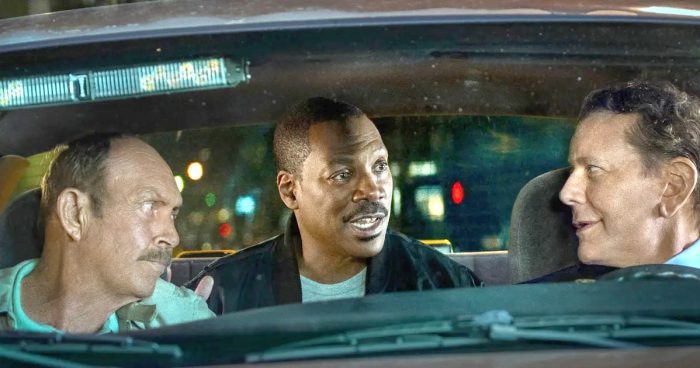
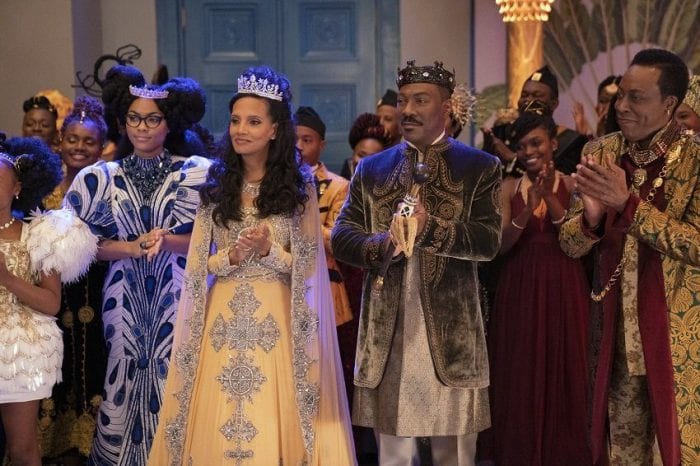
 In addition to his wide-eyed and well-intentioned if slightly oblivious royal, Murphy and co-star Arsenio Hall each played another three supporting roles. The film was funny, raunchy, and a huge hit. While critical response was mixed, it was a financial success. Coming to America was Paramount’s highest-earning film and the third-highest-grossing film in United States box office. Its worldwide total is estimated as high as $350 million. (It is Eddie Murphy’s eighth highest-grossing film.)
In addition to his wide-eyed and well-intentioned if slightly oblivious royal, Murphy and co-star Arsenio Hall each played another three supporting roles. The film was funny, raunchy, and a huge hit. While critical response was mixed, it was a financial success. Coming to America was Paramount’s highest-earning film and the third-highest-grossing film in United States box office. Its worldwide total is estimated as high as $350 million. (It is Eddie Murphy’s eighth highest-grossing film.)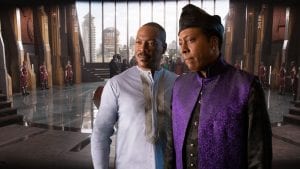 Meanwhile, Zamunda faces a threat from its militaristic neighbor Nextdoria, ruled by dictator General Izzi (Wesley Snipes). Izzi is the older brother of Imani (Vanessa Bell Calloway), who Akeem jilted in the first film. Upon discovery that Akeem has a successor, the General wants Lavelle to marry his daughter Bopoto (Teyana Taylor). All of this frustrates Akeem’s capable eldest daughter, Princess Meeka (KiKi Layne), who aspires to run the kingdom. While being trained as a prince, Lavelle falls in love with his no-nonsense royal groomer Mirembe (Nomzamo Mbatha).
Meanwhile, Zamunda faces a threat from its militaristic neighbor Nextdoria, ruled by dictator General Izzi (Wesley Snipes). Izzi is the older brother of Imani (Vanessa Bell Calloway), who Akeem jilted in the first film. Upon discovery that Akeem has a successor, the General wants Lavelle to marry his daughter Bopoto (Teyana Taylor). All of this frustrates Akeem’s capable eldest daughter, Princess Meeka (KiKi Layne), who aspires to run the kingdom. While being trained as a prince, Lavelle falls in love with his no-nonsense royal groomer Mirembe (Nomzamo Mbatha).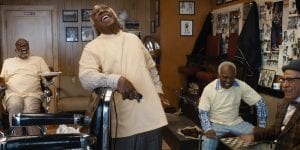 The movie has a few strong moments. One of the best scenes involves a job interview. Lavelle comes into direct conflict with white privilege, embodied by Mr. Duke (Colin Jost). The scene is genuinely funny—Lavelle uses his “white voice” to attempt to secure a position for which he is qualified but under-educated. The encounter reflects Lavelle’s day-to-day challenges. It helps that Fowler has an easy charm and is genuinely likable. His strut is a thin mask for a good young man who wants to grow into a better adult. He never severs his connection to his Queens roots but is open to what Zamunda has to offer. Fowler owns his hero’s journey.
The movie has a few strong moments. One of the best scenes involves a job interview. Lavelle comes into direct conflict with white privilege, embodied by Mr. Duke (Colin Jost). The scene is genuinely funny—Lavelle uses his “white voice” to attempt to secure a position for which he is qualified but under-educated. The encounter reflects Lavelle’s day-to-day challenges. It helps that Fowler has an easy charm and is genuinely likable. His strut is a thin mask for a good young man who wants to grow into a better adult. He never severs his connection to his Queens roots but is open to what Zamunda has to offer. Fowler owns his hero’s journey.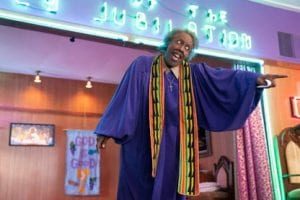 Both Jones and Morgan have the same material they’ve been given elsewhere but usually better crafted. As they have cornered the particular brand of humor, their laughs come easily but their sources are uninspired. In contrast, Layne and Mbatha play it straight and come out with dignity if no laughs.
Both Jones and Morgan have the same material they’ve been given elsewhere but usually better crafted. As they have cornered the particular brand of humor, their laughs come easily but their sources are uninspired. In contrast, Layne and Mbatha play it straight and come out with dignity if no laughs.


